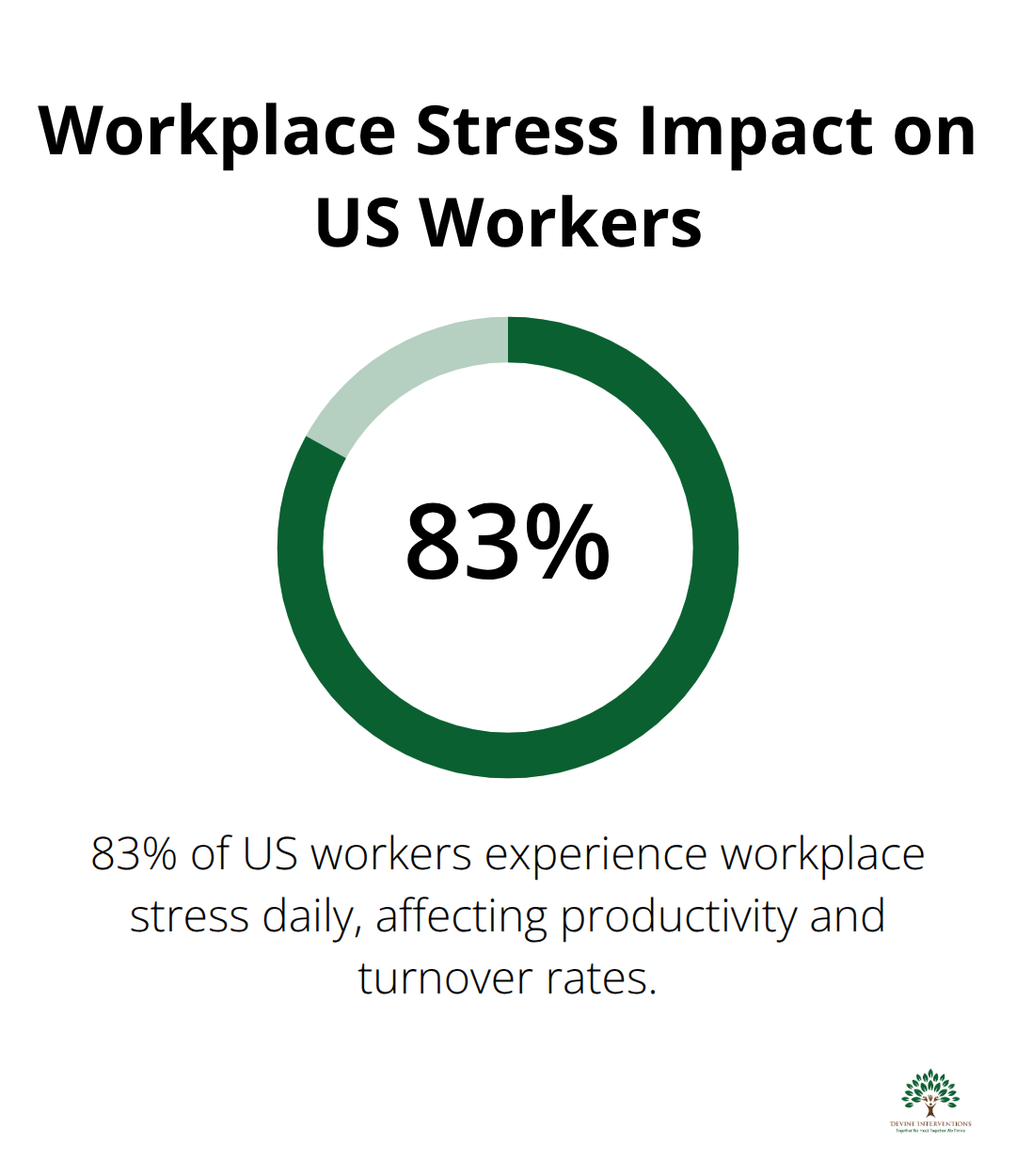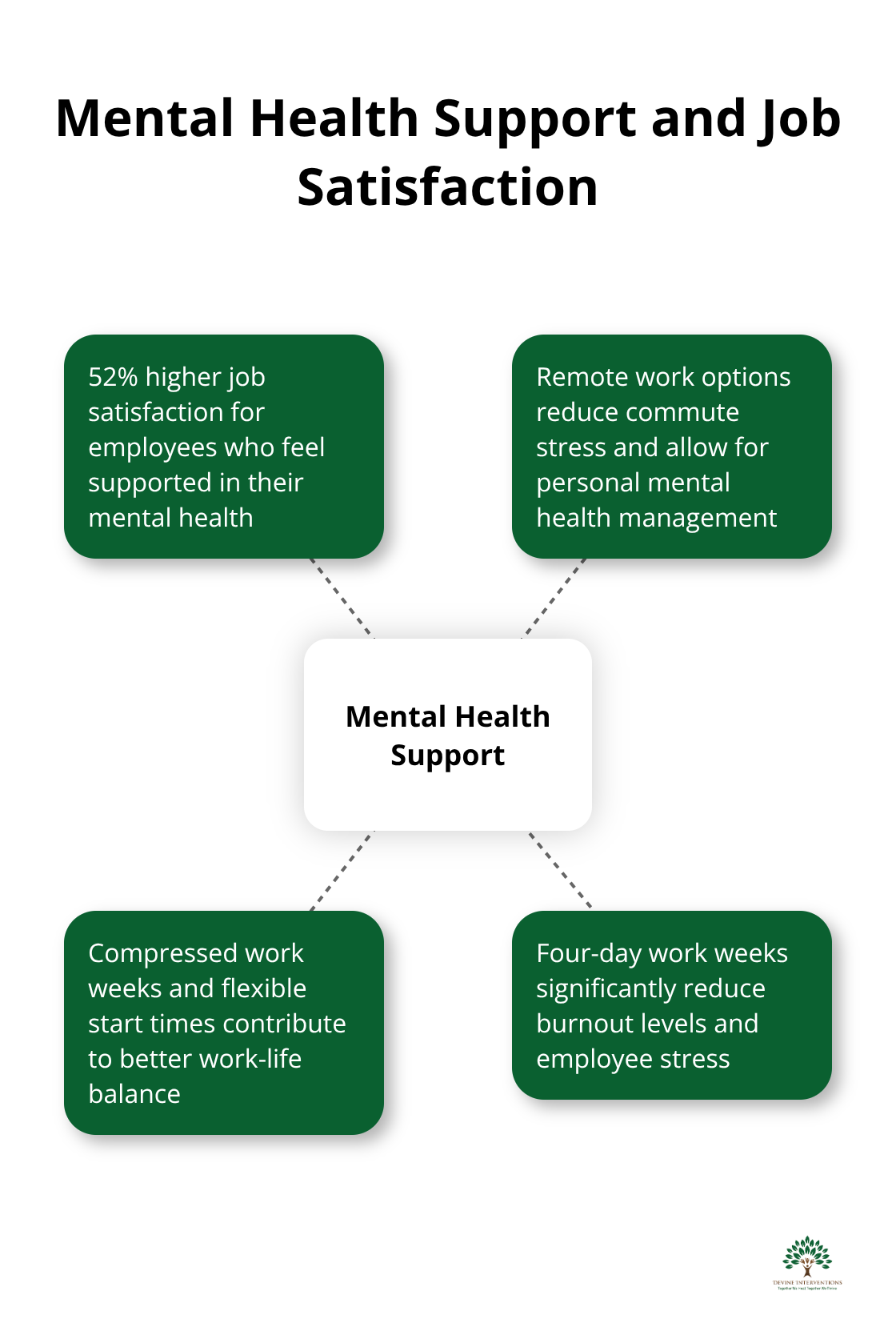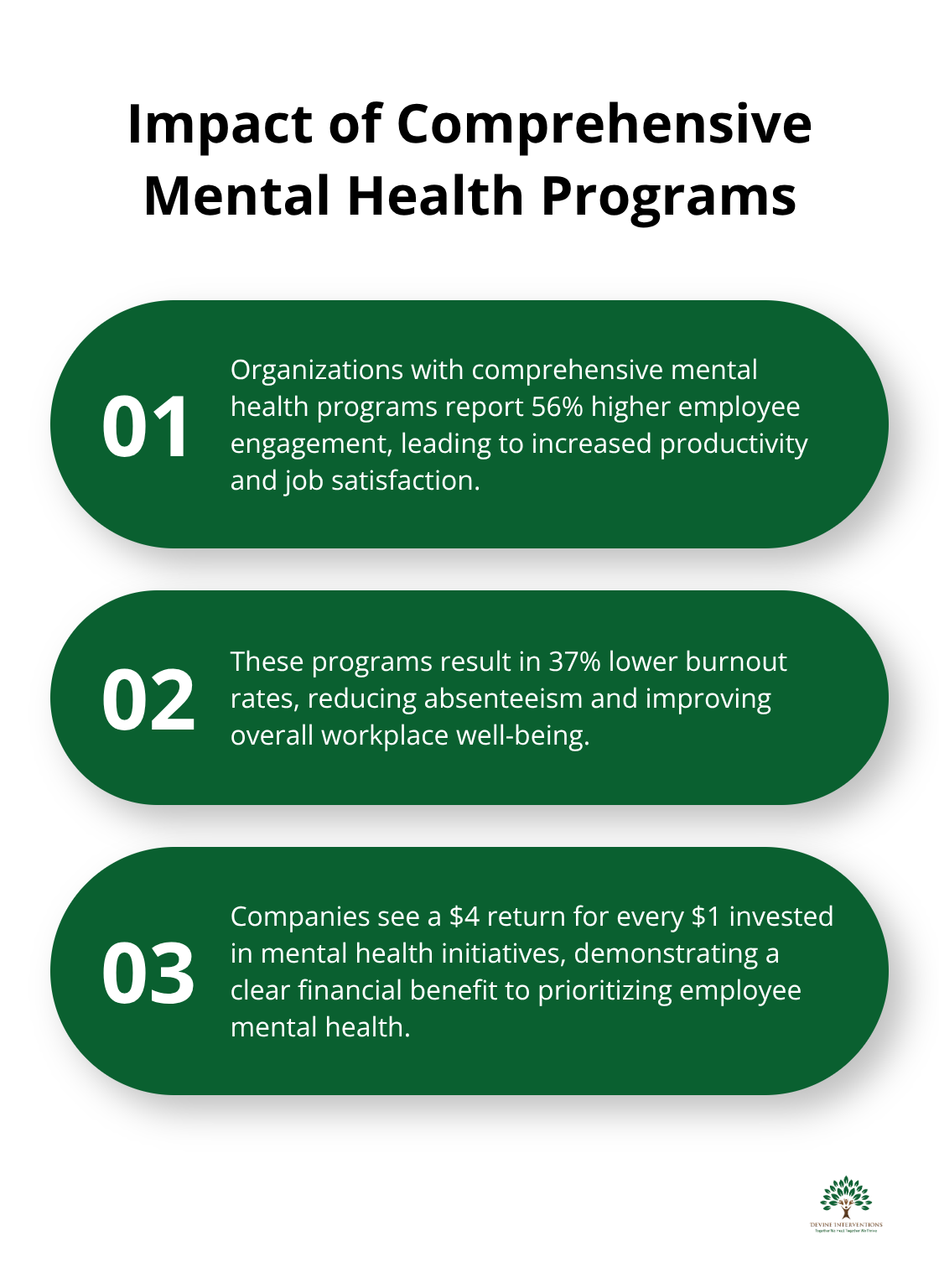Workplace stress affects 83% of US workers daily, leading to decreased productivity and higher turnover rates. Poor mental health costs companies an average of $15,000 per employee annually in lost productivity alone.

We at Devine Interventions understand that promoting mental health wellness in the workplace isn’t just about employee wellbeing-it’s a smart business strategy that drives measurable results.
What Mental Health Crisis Is Your Workplace Facing?
Mental health conditions affect 76% of US workers according to MindShare Partners’ 2021 Mental Health at Work Report, with 84% stating their workplace conditions directly contribute to these challenges. The American Psychological Association’s 2022 Work and Well-being Survey reveals that 81% of workers actively seek employers who support mental health, making this a competitive advantage for forward-thinking companies. Depression and anxiety alone cost the global economy approximately 12 billion working days annually, translating to $1 trillion in lost productivity according to the World Health Organization. These numbers represent real employees who struggle with burnout, anxiety, depression, and stress-related disorders that manifest as absenteeism, presenteeism, and increased healthcare costs.
The Performance Impact You Can’t Ignore
Companies lose an average of $15,000 per employee annually due to mental health-related productivity losses. Organizations with poor mental health support see 37% higher absenteeism rates and 18% lower productivity scores compared to supportive workplaces. The ripple effects extend beyond individual performance – teams experience communication breakdowns, project delays, and increased conflict when members struggle with untreated mental health conditions. Harvard Business Review research shows that employees with strong organizational mental health support report 56% higher engagement and 37% lower burnout rates.
The Real Workplace Mental Health Challenges
Workplace anxiety affects 60% of employees, often triggered by unrealistic deadlines, unclear expectations, and lack of autonomy. Burnout impacts 67% of professionals, characterized by emotional exhaustion, cynicism, and reduced sense of accomplishment. Depression manifests in 26% of workers through persistent sadness, loss of interest, and difficulty concentrating. Stress-related disorders emerge from excessive workloads, job insecurity, and poor work-life boundaries (leading to physical symptoms like headaches, insomnia, and digestive issues) that further impact job performance.
The Hidden Costs of Workplace Mental Health Issues
Mental health challenges create a domino effect throughout organizations. Employees with untreated conditions take 70% more sick days than their mentally healthy counterparts. Turnover rates increase by 40% in companies that ignore mental health support (costing an average of $4,000 per replacement hire). Healthcare premiums rise as stress-related medical visits increase, with mental health conditions accounting for 30% of short-term disability claims. These financial impacts compound when you consider the loss of institutional knowledge and training costs for new hires.
The evidence points to one clear conclusion: workplaces that address mental health proactively position themselves for success, while those that ignore these issues face mounting challenges that affect their bottom line and competitive position.
How Do You Build Mental Health Support That Actually Works?
Companies must dismantle traditional workplace barriers that prevent employees from seeking help. While workplace mental health discussions remain challenging, recent data shows over half (57%) of employees feel more comfortable discussing mental health after workplace initiatives are implemented. This communication breakdown stems from fear of career consequences, stigma, and lack of structured pathways for mental health conversations.
Organizations need formal channels like anonymous feedback systems, regular mental health check-ins during performance reviews, and designated mental health champions who receive specialized training. These champions serve as bridges between employees and leadership, creating safe spaces for difficult conversations while maintaining confidentiality.
Make Flexibility a Mental Health Strategy
Flexible work arrangements directly impact mental health outcomes. Research demonstrates that employees who feel supported in their mental health are 52% more likely to be satisfied with their jobs. Remote work options, compressed work weeks, and flexible start times reduce commute stress and allow employees to manage personal mental health needs.

Companies that implement four-day work weeks see significant reduction in burnout levels and less stress among employees. Work-life balance policies must include clear boundaries around after-hours communication, mandatory vacation time usage, and protected time for mental health appointments (with organizations tracking utilization rates to identify barriers that prevent employee adoption).
Train Managers to Spot Mental Health Warning Signs
Managers influence 70% of employee engagement, making their mental health training essential for workplace wellness success. Effective manager training covers recognition of signs like decreased productivity, increased irritability, social withdrawal, and changes in appearance or work quality.
Research shows that managers trained in mental health awareness reduce employee turnover and improve team performance significantly. Training should include specific conversation frameworks, referral processes, and legal considerations around mental health accommodations (with managers needing ongoing support through coaching sessions and access to mental health professionals for guidance on complex situations).
These foundational elements create the framework for more targeted mental health interventions that address specific employee needs and workplace challenges.
What Mental Health Programs Actually Move the Needle?
Employee Assistance Programs represent the most underutilized mental health resource in corporate America. Only 5% of eligible employees access these services annually despite their proven effectiveness. Companies that promote EAP utilization see 26% higher employee retention rates and 18% reduction in healthcare costs according to the Employee Assistance Professionals Association.
Successful EAP implementation requires active promotion through multiple channels, manager referral training, and integration with existing HR processes. Organizations must track utilization metrics and conduct regular surveys to identify barriers that prevent employee engagement with these critical resources.
Transform Workplace Stress Through Structured Programs
Stress management workshops produce measurable results when companies implement them systematically rather than as one-time events. The American Institute of Stress reports that companies offering regular stress management training see 23% reduction in stress-related absences and 27% decrease in employee turnover rates.
Effective programs combine practical techniques like progressive muscle relaxation, time management strategies, and cognitive behavioral approaches with ongoing practice opportunities. Mindfulness training specifically shows remarkable impact (with Google’s Search Inside Yourself program demonstrating 34% improvement in emotional regulation and 27% reduction in stress levels among participants).
Organizations should schedule monthly workshops, provide follow-up resources, and create peer support groups to maintain momentum between sessions.
Make Mental Health Check-ins Strategic Business Practice
Regular mental health check-ins must become systematic rather than reactive responses to crisis situations. Companies that implement quarterly mental health assessments report 19% improvement in early problem identification and 31% reduction in mental health-related sick days according to Workplace Mental Health Institute research.
These check-ins should include standardized screening tools, private conversation opportunities with trained personnel, and clear pathways to professional resources when needed. Mental health days require strategic implementation beyond simple PTO policies.
Design Mental Health Days That Work
Successful mental health day programs include dedicated days separate from vacation time, manager training on approval processes, and follow-up support to address underlying issues. Organizations that track mental health day utilization find that employees who take these days proactively show better long-term mental health outcomes compared to those who only take time off during crisis periods.
Companies must create clear policies that remove stigma from mental health day requests (ensuring managers understand approval criteria and employees feel safe using these benefits without career consequences).
Final Thoughts
Companies that prioritize mental health wellness in the workplace see measurable returns on investment. Organizations with comprehensive mental health programs report 56% higher employee engagement, 37% lower burnout rates, and $4 return for every $1 invested in mental health initiatives according to the World Health Organization. These immediate actions create foundation for long-term success while demonstrating organizational commitment to employee wellbeing.
The long-term impact extends beyond individual employees to transform entire organizational cultures. Companies with strong mental health support retain top talent 40% longer than competitors and experience 23% reduction in healthcare costs (with quality candidates actively seeking employers who prioritize workplace mental health support when making career decisions). These organizations position themselves as employers of choice in competitive talent markets.
We at Devine Interventions understand that workplace mental health requires professional expertise and comprehensive support systems. Our evidence-based approach combines individual therapy, group sessions, and case management to address the root causes of workplace stress and mental health challenges. Contact Devine Interventions today to develop mental health resources that support your employees and strengthen your organization’s competitive advantage.








